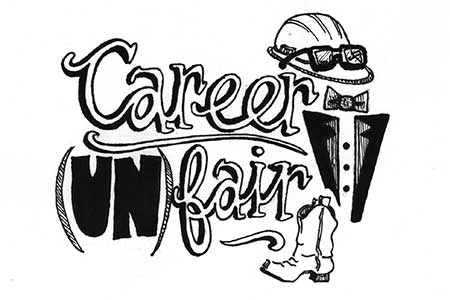The staff editorial is the majority opinion of The Murray State News Editorial Board.

Murray State advertises the All Majors Career Fair as a valuable networking opportunity and a way to begin the post-graduate job search. However, the term “all majors” needs to be revised.
A list of employers participating in this semester’s Career Fair indicated that of the 145 majors and areas of study offered at Murray State, 95 majors were not listed as being sought after directly by employers participating in the event. Exceptions to this were employers like Wal-Mart and the Marine Corps, who were seeking applicants from all educational backgrounds.
To be fair, Career Fair recruiters come by choice. There is only so much the University can do to include more major representation.
But professors teaching senior seminar and capstone classes tend to make the Career Fair a requirement, and it is questionable how much value their students will get from the experience.
The most sought after major for this semester’s employers is occupational safety and health, which constitutes about 15 percent of all employment opportunities represented.
According to Psychology Today, Post Commencement Stress Disorder is real. PCSD is a condition that affects graduates who face the task of choosing, changing or pursuing a career beyond the protected bubble provided by college. Recent graduates commonly feel anxiety and amplified stress from the fear of the unknown, and the current state of our Career Fair does little to help. Such an underrepresentation of majors adds to the fear that our degrees are losing value.
We understand that the amount of success we have after graduation is largely up to us. We join extracurriculars, apply for internships and do as much as we can to make ourselves marketable. We don’t expect the Career Fair to do all the hard work for us, but we want to know that our hard work will get us somewhere.
When universities recruit students, they mention that the average salaries and career opportunities for someone with a bachelor’s degree is greater than someone who doesn’t go to college.
It’s not an easy transition from college to a career. According to a 2010 study conducted by the Federal Reserve Bank of New York, only 27 percent of college graduates land jobs in their field of study, but we’re reassured that going to college is a step in the right direction, and that we shouldn’t minimize the importance of our degrees.
The Career Fair has good intentions of establishing relationships between job-seekers and employers, but the lack of variety doesn’t give students the opportunities they need to get the career they studied for.
Since The Atlantic reported that Murray State art majors have the lowest net return for their degrees last year, we have something to prove. The article didn’t do much to spark student confidence in their futures, so it should be our obligation to uphold the message that all majors matter. We need the reassurance that our time at Murray State can be translated to success, and the Career Fair would be a good place to start.
According to a 2012 report about the Career Fair, approximately 320 students showed up to the event, much lower than the approximately 700 students that attended in the previous year.
This lack of enthusiasm isn’t a coincidence. The waning attendance rates could indicate low confidence in the Career Fair. Why would students go if there aren’t employers who want them?